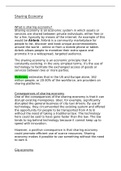College aantekeningen
Class notes on Sharing Economy (R_GRET)
- Instelling
- Vrije Universiteit Amsterdam (VU)
What is sharing economy? Explore for detail regarding the consequences of sharing economy, and how this affects the law surrounding emerging technologies. What is gig economy? Are companies such as Airbnb and Uber the way forward?
[Meer zien]




